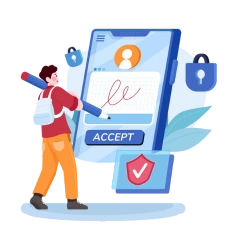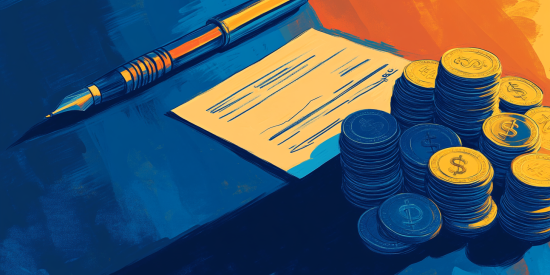The term “returned check fee” carries significant weight in the knotty landscape of financial transactions. This monetary penalty imposed by banks and credit unions has two purposes: safeguarding against unchecked transactions and allowing financial institutions to recoup costs associated with handling the complexities of returned checks. Join us as we unravel the layers surrounding the fees, offering a strategy for effective management and prevention.
What is a Returned Check Fee?
A returned check fee, often called a bounced check, is a financial penalty charged by banks or credit unions. You can be charged one when a customer writes a check that can’t be processed, either due to insufficient funds or other reasons. Depending on the type of check, the check-clearing process date may vary. The fee serves as a deterrent to prevent bounced checks and as a means for financial institutions to recover the administrative costs of handling the returned check.
How Much is a Returned Check Fee on Average?
Before committing to a bank, you must ask yourself: What is the bounced check fee, and how can it be avoided? The average fee amount for a returned check varies among financial institutions. While the median fee is approximately $12, it’s crucial to recognize that different banks may impose varying charges. For example, certain banks, such as American Express, may enforce a higher fee, reaching up to $38 for returned payments. Understanding your bank’s specific fee structure can help you bypass the potential financial consequences of returned checks.
Why Did I Get a Returned Check Fee?

You may wonder, “Why did I get a returned check fee?” It is triggered when an individual’s check doesn’t go through. Other reasons for a returned check may include a closed or frozen account. If the recipient attempts to deposit a bounced check, state laws often allow them to recoup the lost funds, leading to the imposition of returned check fees.
Fraud can also result in a fee from a returned check, as scammers understand how to manipulate the check processing system. To avoid this, you must know whether a check is fake and other basic banking information.
Some Consequences of a Returned Check
Beyond the immediate financial penalty, a bounced check has additional repercussions. Although bounced checks typically aren’t reported to credit reporting agencies, repeated instances might be communicated to consumer reporting agencies like ChexSystems. Such occurrences can hinder the individual’s ability to open a new bank account. Additionally, if bounced checks contribute to regular late payments, there could be adverse effects on the individual’s credit score.
How to Handle a Returned Check Fee
Understanding how to verify funds on a check can help you avoid unnecessary fees. As the recipient of a bounced check, the writer is generally responsible for paying the fee. If the sender is notified about insufficient funds, it’s advisable to refrain from depositing the check immediately. Effective communication with the bank and the payee is crucial, and addressing the situation promptly can help minimize potential consequences.
Generally:
- Consider negotiation: In some cases, communicating with the bank and explaining the circumstances might result in a reduction or waiver of a bounced check fee, especially for first-time offenses.
- Explore payment options: Work with the check writer to find a suitable solution for covering the check amount and associated fees. This could involve arranging a payment plan or seeking alternative means of payment.
How to Avoid a Fee for a Returned Check

To proactively prevent returned check fees, individuals can take the following measures:
- Check if it’s cleared: Act promptly to cancel or stop a bad check once it triggers.
- Contact the receiver: Inform the recipient of the check about the situation, and they may choose not to deposit it, avoiding additional fees.
- Contact your financial institution: Some banks may consider waiving fees for first-time offenses, especially if the account has a solid history. Ensure the account has sufficient funds to cover the original check and associated fees.
- Make habitual changes: Establish budgeting practices, regularly balance your checkbook, and monitor your account to avoid situations where a bad check may happen.
- Explore overdraft protection: Consider opting for overdraft protection if available, as it can provide a buffer in case of accidental oversights. Be aware of any associated fees with overdraft protection.
- Utilize electronic payments: Instead of relying solely on paper checks, consider using electronic payment methods to ensure immediate fund availability and reduce the risk of bounced checks.
Accept eChecks With Confidence!
Choose an eCheck platform that processes checks securely.
worry-free
Key Takeaways and Bottom Line
Key takeaways:
- Returned Check Fee Overview: Understand that a check fee is charged by financial institutions when a check can’t be processed due to insufficient funds or other reasons.
- Varied Fee Amounts: The fees vary among financial institutions, and knowing your bank’s specific fee structure is important.
- Causes: Insufficient funds or a closed/frozen account can trigger a check fee. Recipients may also charge fees for deposit attempts.
- Consequences Beyond Fees: Bounced checks may not be reported to credit bureaus but can impact consumer reporting agencies, potentially affecting your ability to open new accounts.
- Handling: The responsibility usually falls on the check writer. Negotiate with the bank, communicate with the payee, and explore payment options to minimize consequences.
- Proactive Measures: Act promptly if a check is bad, inform the recipient, maintain sufficient funds, establish budgeting practices, and consider overdraft protection or electronic payments.
The fees from a returned checks can have lasting consequences beyond immediate financial penalties. However, by understanding the causes, consequences, and proactive measures, individuals can navigate these challenges effectively, protecting their economic well-being and credit standing. Open communication and responsible financial habits are crucial in managing and preventing check fees.
Running a high-risk business will always come with challenges; one of the last things you need is the burden of returned check fees. By incorporating eChecks and utilizing Electronic Check Verification, you can enhance your payment processes, providing a secure and efficient way to verify funds and reduce the risk of returned checks. These charges can quickly increase, eating away at your profits and causing unnecessary headaches. You can protect your business from these pitfalls by taking preventative steps and setting up a high-risk merchant account with a trusted processor. With specialized support and tailored solutions, you’ll avoid fees and streamline your credit card processing, ensuring smoother transactions and happier customers. Don’t let check fees derail your success—take control of your finances and secure the stability your business deserves.






